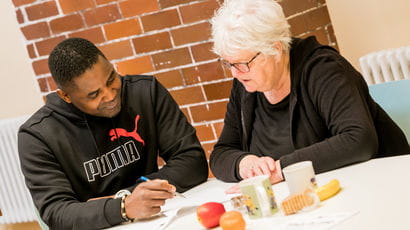Bristol Hub mental health partnership
A case study about the Bristol Hub.
The Bristol Hub was led by the University of the West of England (UWE Bristol), working closely with the University of Bristol (UoB), the Students’ Union at UWE, University of Bristol Students’ Union, Avon and Wiltshire Mental Health Partnership NHS Trust, the West of England Academic Health Science Network, and Bristol City Council.
What was delivered
The Bristol Hub did not create a new service for students, but brought together professionals from the UoB, UWE Bristol and staff from NHS primary and secondary mental health services to focus on solving structural and operational issues such as liaison and collaboration between services, referral pathways, and sharing knowledge and research to co-create a better understanding of local students’ needs.
A governance structure was established which embeds collaboration across the key higher education (HE) and NHS service providers:
- Practice Liaison Forum – brings together professionals from HE and NHS services to improve shared understanding of student mental health needs at a practice level, and develop joint working practices between higher education providers and the NHS. The forum meets every month to six weeks.
- Operational Group – sets strategic goals, monitors progress and coordinates actions related to student mental health between higher education providers and the NHS. It meets bi-monthly, with membership including service managers from UWE Bristol, UoB and Avon and Wiltshire Mental Health Partnership.
- Steering Group – provides strategic oversight, improving access to and outcomes of mental health care for HE students. It meets three times a year, co-chaired by UWE Bristol Vice-Chancellor and a UoB Pro-Vice-Chancellor, and membership includes senior service leads from HE and NHS services, Public Health, Clinical Commissioning Group, and Students’ Union representatives.
These structures set up by the Bristol Hub have led to greatly increased levels of communication and understanding of roles between services. “Student leads” have been identified for the key NHS services, with a role description agreed. The student leads in crisis teams have details of university contacts to enable serious concerns to be reported quickly.
The Practice Liaison Forum has arranged training sessions and shadowing opportunities to improve understanding of services, roles and pathways, ensuring that referrals are made and handled more consistently. Regular contact between professionals allows service level issues to be escalated quickly to other services.
Student co-production
The two Students’ Unions in Bristol were active partners in the project, and elected student officers were involved in the design of the project and were members of the Operational and Steering Groups.
Bristol SU recruited and trained two student researchers to carry out a student-led research project. An online survey was sent to approximately 1900 students who had accessed wellbeing support during the 2019-20 academic year. A further 20 students then took part in more in-depth interviews looking at their experiences of accessing mental health support services while at university.
The report from this research covers findings in four key areas:
- Experiences of referral pathways – students shared about confusion, inconsistencies, and long waits as key factors in their experiences.
- Perceptions of a link between services – students shared that they didn’t know how services were connected, how they shared information, or where the remits and boundaries of services were.
- International Students – students felt that unfamiliar services or systems weren’t explained adequately, and that cultural differences acted as a barrier to accessing treatment.
- Accessing support – the variety of support pathways and entry points led to a range of different signposts and outcomes.
Impact
An end of project event was held in January 2022, attended by senior managers, service leads and professionals from the two universities, Avon and Wiltshire Mental Health Partnership, Bristol Public Health and the local Clinical Commissioning Group (CCG). A series of recommendations to build on the work of the Bristol Hub were presented.
Structural and strategic recommendations:
- Ensure the universities are represented in the new NHS Integrated Care Partnerships, which aim to drive collaboration and better integrate services across the region, and the Community Mental Health Framework.
- Develop a proposal to commission a Student Liaison Service, informed by the Liverpool Model. The universities have been invited by local NHS to bid for funding to pilot and evaluate a new collaborative service through the Community Mental Health Framework.
- Continue the Practice Liaison Forum, supported by both universities and the NHS, including training and shadowing opportunities.
- Explore the establishment of a Student Mental Health HIT (Health Integration Team), providing a structure for collaborative research and innovation.
Operational recommendations:
- Ward packs have been developed for local NHS teams to encourage students to share information with their university. These need to be sense-checked with local psychiatric liaison teams before being put in place.
- Establish working groups under the Practice Liaison Forum to consider key issues affecting support for some particular groups of students: recent graduates, looking at the transition from university (where mental health support is more easily available) to post-graduation (when waiting lists can be longer); international students, where there are some particular cultural barriers; and autistic students, linking with the new OfS Mental Health Funding Competition project led by University of Bristol.
Following the January event, the universities were invited by the Director of Public Health for Bristol to apply for funding from an NHS Transformation Fund managed by the CCG, to build on the collaboration established by the Bristol Hub. Funding has now been secured (match funded by the two universities in Bristol) which will be used to develop and evaluate a pilot Student Liaison Service.
Student Mental Health Partnerships Project
UWE Bristol led a partnership across the Higher Education sector to improve care for students in need of mental health support through the development and evaluation of local partnerships between universities, the NHS and Students’ Unions, connected via a National Learning Collaborative.
Student Mental Health Partnerships ProjectYou may also be interested in

Greater Manchester mental health partnership
A case study on the Greater Manchester Universities Student Mental Health Service pilot.

Liverpool mental health partnership
A case study on the Liverpool mental health partnership.

North London mental health partnership
A case study on the North London mental health partnership.

Sheffield Hub mental health partnership
A case study on the Sheffield mental health partnership.
